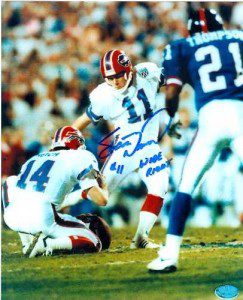Hemant Mehta last month highlighted a newspaper study that found 32 out of 32 Tennessee high school football coaches surveyed said they endorse some form of team prayer.
Set aside the First Amendment issues here — the unconstitutionality of establishing evangelical piety as a requirement of public school athletics, the unfairness of coercing students to conform to that piety, the distorting effect that such coerced conformity has on evangelical piety itself, and the various other disastrous effects for church, state and free exercise that any religious establishment inevitably produces. I’m a Baptist Baptist, not a Southern Baptist, and obviously I’m going to be critical of this kind of hegemonic stampeding of individual conscience and the separation of church and state that protects it.
So let’s focus instead on the potential here for research.
A high school football team is entwined in two of the most scrupulously measured arenas: sports and education. Sports and public education are chock-full of statistics. They keep all kinds of stats, measuring all kinds of outcomes.
So what we have here is a ton of data — win/loss records, offensive and defensive rankings, SAT scores, scholarships earned, graduation rates, attendance, disciplinary records, concussion rates, injury rates, percentage of student-athletes going on to college, etc. And this rich mine of data goes back years, allowing longitudinal study of long-term effects or the lack thereof.
Happily, it seems that some of these coaches have even devised methods of measuring and recording spiritual data:
Whitwell coach Billy Barnhart said he still conducts prayer before and after each day’s practice as well as prayer in the locker room before taking the field each Friday. … Like several other area coaches, Barnhart took the team to an off-campus preseason camp that included daily Bible devotionals.
“We had 21 kids get saved at this year’s camp,” Barnhart said. “I want to win as much as anybody, but if I don’t win a single football game this year I feel successful because of those 21 kids who became Christians. Nothing is more important than that.”
Again, while I’m personally sympathetic to the volumes of insightful criticism directed toward this kind of evangelistic score-keeping, let’s not get into that here. Here, instead, I just want to note the research potential that such evangelistic score-keeping provides. This is more data.
At one basic, shallow level, this vast treasure-trove of data can be used to gauge the efficacy of these team prayers. Win/loss records won’t be much help here, because: A) Coaches and teams tend to be more sophisticated in their prayers than straightforward requests for victory; and B) The entire league is apparently praying, and the win/loss record for the entire league in any given year will always be .500.

Based on my own long experience in evangelical sports leagues (six years of Bread of Life baseball, five years of church basketball league, six years of three JV and varsity sports in the Jersey Christian Athletic Conference), I would say that two of the most common explicit requests of pre-game prayers are: 1) Safety from injury, and 2) That everyone on the team performs to the best of their abilities. The first of these is an easily measurable outcome: What is the rate of injury for teams that pray vs. the rate of injury for teams that do not? The second is a bit fuzzier, but might be addressed through press coverage of post-game comments from coaches and players, wherein representatives of the losing team often express disappointment in their failure to perform to the best of their abilities.
In general, though, even the best measurements and the most scrupulously collected data can’t tell us much about the “efficacy” of prayer. Such data can’t identify whether the fault with an inefficacious prayer lies with the supplicant or with the deity. Plus, “mysterious ways” and all that. “The prayers of the righteous availeth much,” but if you ask the righteous about that, they’ll always insist that what such prayers availest isn’t always quite what they had been specifically expecting them to avail.
What’s far more interesting, though, is the question of the purported benefits of the ritual of high-school football team prayers as a ritual. That is what the coaches interviewed by Stephen Hargis of the Chattanooga Times Free-Press all insist is the real purpose of their team prayers. They don’t defend these prayers on the basis of their potential efficacy at obtaining a particular set of prayer requests, they defend them as a ritual that shapes the lives and character of their players.
And the outcome of this ritual, as a ritual, can be measured by examining the wealth of data being collected on these high-school players — data tabulating every aspect of their athletic and academic record.
Alas, though, there seems to be a fatal flaw in my proposed research project. We don’t have a control group against which to compare these students.
Hargis searched all over Tennessee, but he was unable to find a single high-school football coach who was not committed to the ritual of team prayers.
















